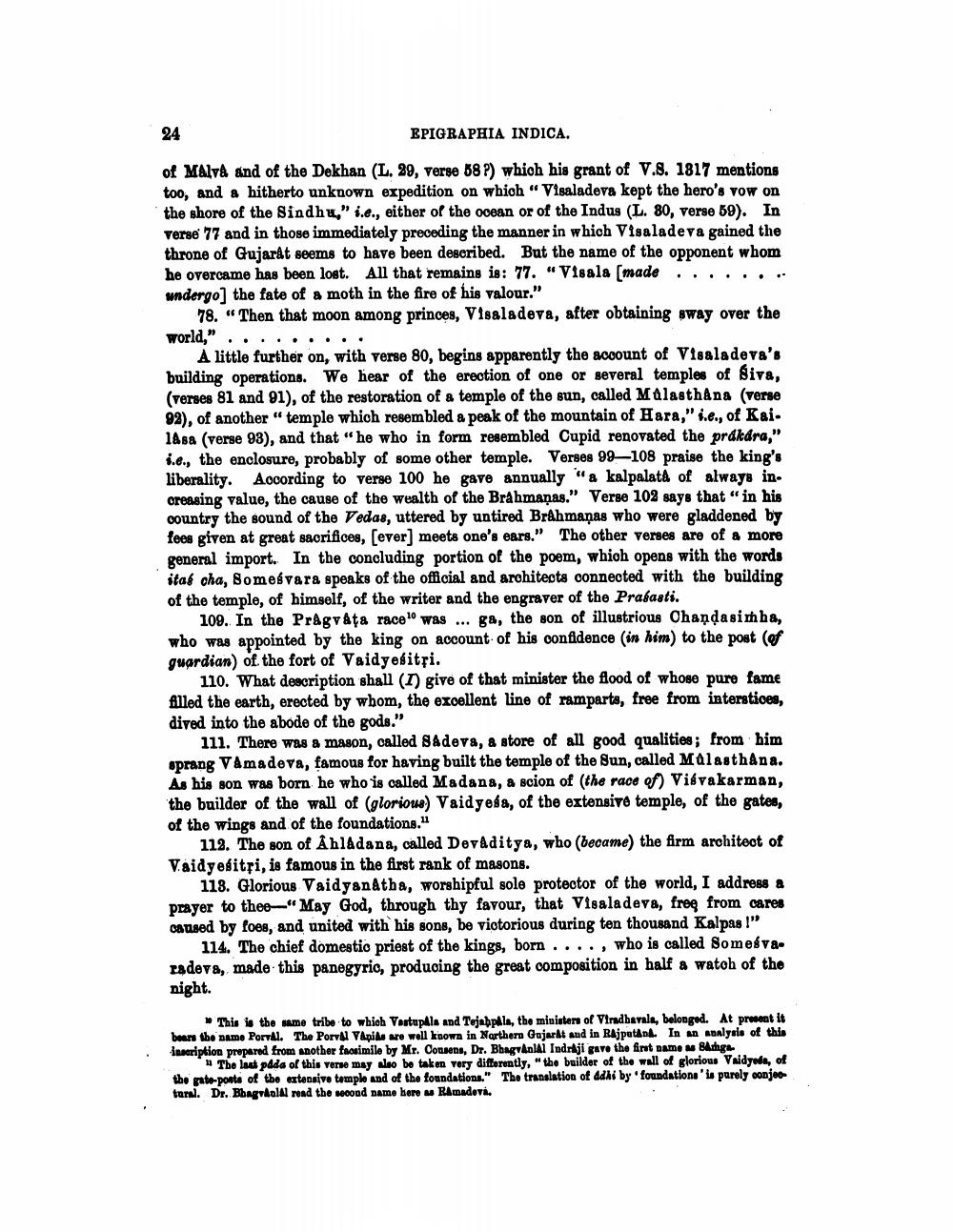________________
24
EPIGRAPHIA INDICA.
of Malva and of the Dekhan (L. 29, verse 58 ?) which his grant of V.8. 1817 mentions too, and a hitherto unknown expedition on which "Visaladeva kept the hero's vow on the shore of the Sindhu," i.e., either of the ocean or of the Indus (L. 80, verse 59). In verse 77 and in those immediately preceding the manner in which Visaladeva gained the throne of Gujarat seems to have been described. But the name of the opponent whom he overcame has been lost. All that remains is: 77. "Visala [made undergo] the fate of a moth in the fire of his valour."
78. "Then that moon among princes, Visaladeva, after obtaining sway over the world,"
A little further on, with verse 80, begins apparently the account of Visaladeva's building operations. We hear of the erection of one or several temples of Siva, (verses 81 and 91), of the restoration of a temple of the sun, called Malasthana (verse 92), of another" temple which resembled a peak of the mountain of Hara," ie., of Kailasa (verse 93), and that "he who in form resembled Cupid renovated the prákára," i.e., the enclosure, probably of some other temple. Verses 99-108 praise the king's liberality. According to verse 100 he gave annually "a kalpalata of always increasing value, the cause of the wealth of the Brahmanas." Verse 102 says that "in his country the sound of the Vedas, uttered by untired Brahmanas who were gladdened by fees given at great sacrifices, [ever] meets one's ears." The other verses are of a more general import. In the concluding portion of the poem, which opens with the words itas cha, Somesvara speaks of the official and architects connected with the building of the temple, of himself, of the writer and the engraver of the Prasasti.
109. In the Pragvâța race was... ga, the son of illustrious Chanḍasimha, who was appointed by the king on account of his confidence (in him) to the post (of guardian) of the fort of Vaidyesitri.
110. What description shall (7) give of that minister the flood of whose pure fame filled the earth, erected by whom, the excellent line of ramparts, free from interstices, dived into the abode of the gods."
111. There was a mason, called Sadeva, a store of all good qualities; from him sprang Vamadeva, famous for having built the temple of the Sun, called Malasthana. As his son was born he who is called Madana, a scion of (the race of) Viśvakarman, the builder of the wall of (glorious) Vaidyesa, of the extensive temple, of the gates, of the wings and of the foundations."
112. The son of Ahladana, called Devaditya, who (became) the firm architect of Vaidyesitri, is famous in the first rank of masons.
118. Glorious Vaidyanatha, worshipful sole protector of the world, I address a prayer to thee "May God, through thy favour, that Visaladeva, free from cares caused by foes, and united with his sons, be victorious during ten thousand Kalpas!"
114. The chief domestic priest of the kings, born...., who is called Someśvazadeva, made this panegyric, producing the great composition in half a watch of the night.
This is the same tribe to which Vastupala and Tejabpala, the ministers of Viradhavala, belonged. At present it bears the name Porval. The Porval Vapids are well known in Northern Gujarat and in Rajputana. In an analysis of this inscription prepared from another facsimile by Mr. Cousens, Dr. Bhagvanlal Indraji gave the first name as Barga
The last pada of this verse may also be taken very differently, "the builder of the wall of glorious Vaidyoda, of the gate-posts of the extensive temple and of the foundations." The translation of ddhi by foundations 'is purely conjectural. Dr. Bhagvanlal read the second name here as Ramadeva.




